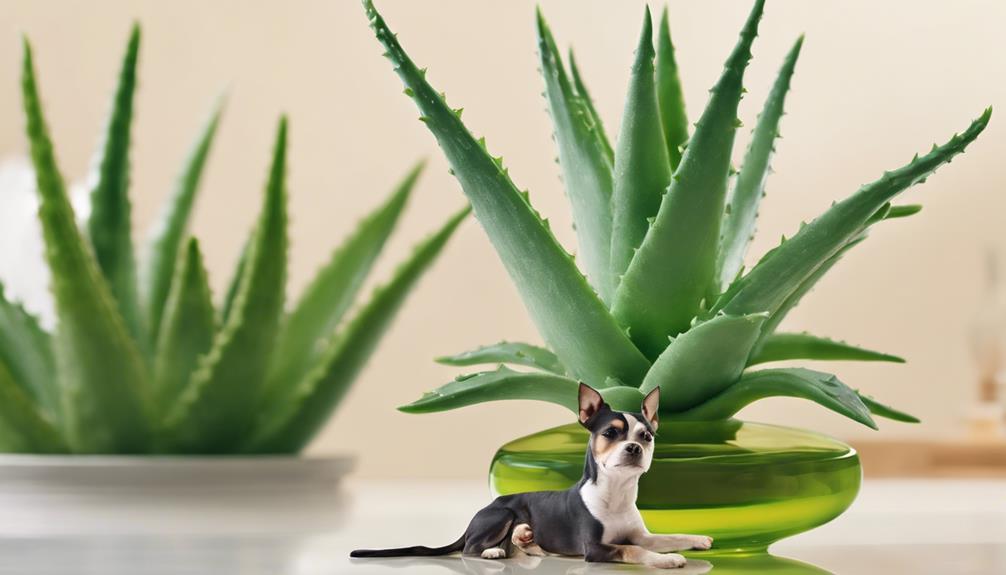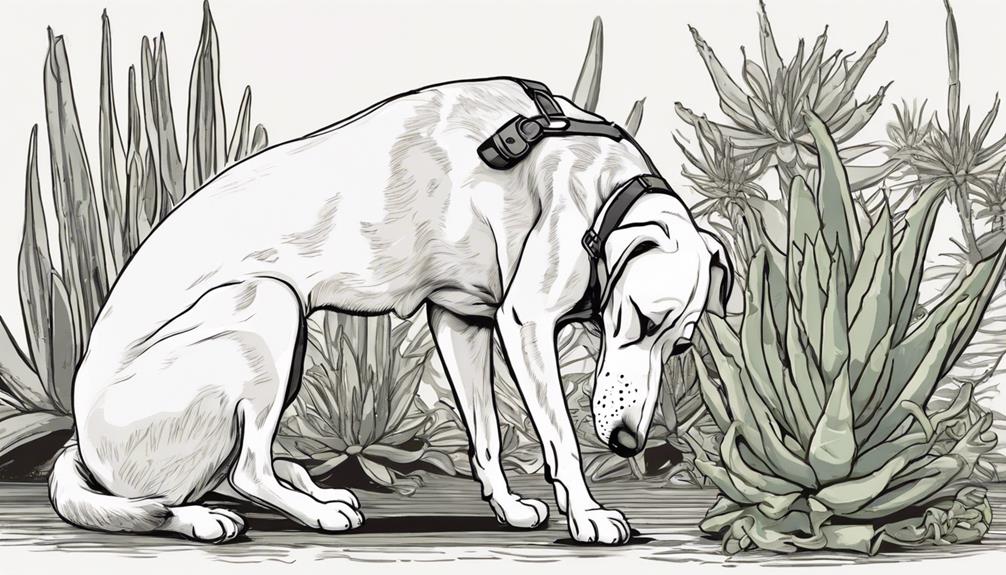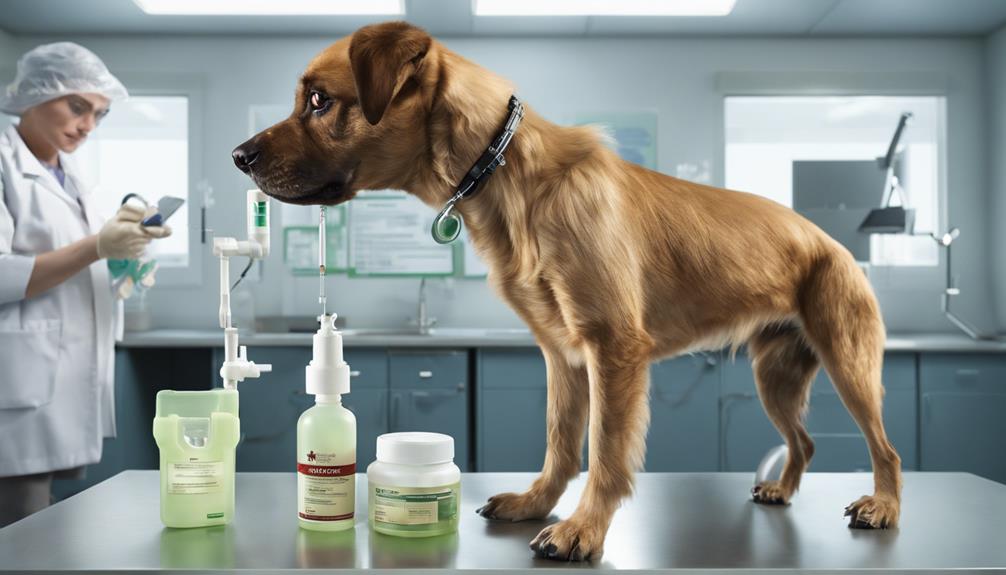When it comes to dogs, even a tiny bit of aloe can cause tummy issues. Too much can lead to seizures and urine color changes. The danger level varies based on the amount eaten and the dog's size. Watch for signs like stomach upset shortly after aloe consumption. Reach out to a vet if you suspect aloe ingestion. Understanding aloe's potency can safeguard your furry friend's health.
Key Takeaways
- Small amounts of Aloe Vera can cause gastrointestinal upset in dogs.
- Large doses may lead to severe symptoms like tremors and urine color changes.
- Toxicity level varies based on ingested amount and dog size.
- Symptoms may manifest within hours of Aloe Vera ingestion.
- Contact a vet immediately if Aloe ingestion is suspected in dogs.
Aloe Vera Toxicity in Dogs
When dogs ingest Aloe Vera, they may experience toxicity due to the chemical saponin present in the latex, leading to various severe symptoms. Aloe Vera leaves contain this toxic substance that can cause harm to our canine companions. Symptoms of Aloe Vera poisoning in dogs include cramping, nausea, diarrhea, and dehydration.
If a dog consumes Aloe Vera, they might exhibit excessive drooling, vomiting, loss of appetite, low blood sugar, and red blood cell breakdown. In severe cases, ingestion can even lead to coma and death. It's important to monitor the amount of Aloe Vera accessible to dogs to prevent accidental ingestion.
Immediate veterinary attention is necessary if Aloe Vera poisoning is suspected. Remember, even skin contact with Aloe Vera can cause irritation in dogs, so it's crucial to keep this plant out of reach and safeguard the safety of our furry friends. Stay vigilant and keep your pets safe from substances that are toxic to dogs.
Aloe Vera Components and Toxicity

Aloe Vera contains a harmful component known as saponin found in the latex, which can cause cramping and dehydration in dogs.
Symptoms of aloe toxicity in dogs include excessive drooling, vomiting, and loss of appetite.
It's important to seek immediate treatment if your dog ingests aloe, as it can lead to coma and death if left untreated.
Aloe Vera Toxicity Overview
Often overlooked, the chemical saponin found in the latex of Aloe Vera is responsible for causing toxicity in dogs. To grasp the risks of Aloe Vera for our furry friends, let's break down the components and toxicity in a simple table:
| Component | Toxicity in Dogs |
|---|---|
| Saponin | Causes toxicity |
| Latex | Contains saponin |
| Anthraquinones | Mild toxicity |
| Aloin | Laxative effect |
| Minerals | Not toxic |
Aloe Vera can be harmful to dogs due to these components, particularly saponin in the latex. It is vital to be cautious with Aloe Vera products around pets to prevent any accidental ingestion.
Symptoms of Aloe Poisoning
Experiencing symptoms of aloe poisoning in dogs can be concerning and require immediate attention from a veterinarian. If your dog has ingested aloe vera gel, latex, or plants, watch for signs like vomiting, diarrhea, dehydration, and weakness. These symptoms indicate potential aloe toxicity.
Aloe vera contains saponin, a compound that can cause gastrointestinal issues in dogs. The severity of toxicity depends on the amount of aloe consumed and the size of the dog. If you notice any of these symptoms, it's important to seek prompt veterinary attention.
Treatment for Aloe Toxicity
Upon ingestion of aloe vera components, immediate veterinary intervention is vital to address potential toxicity in dogs. Clinical signs of aloe toxicity, such as vomiting, drooling, and low blood sugar, indicate the need for prompt medical attention.
Aloe can lead to the breakdown of red blood cells, posing a serious threat to your pet's health. If aloe ingestion is suspected, seek immediate veterinary attention to mitigate the risks. Veterinarians may recommend inducing vomiting to remove the harmful substances from the dog's system.
It's essential that aloe toxicity is treated immediately to prevent further complications. Remember, aloe is toxic to animals, so keep it out of reach to guarantee your furry friend's safety.
Symptoms of Aloe Poisoning in Dogs

When a dog ingests aloe, they might experience symptoms such as vomiting, diarrhea, depression, and changes in urine color.
In severe cases, aloe poisoning can even lead to tremors and seizures in dogs.
It's important to seek immediate veterinary care if your dog shows any signs of aloe toxicity.
Dog Aloe Poisoning Signs
We often see dogs exhibiting symptoms of aloe poisoning, such as vomiting, diarrhea, depression, anorexia, and changes in urine color. Tremors and seizures, although rare, can also occur in cases of aloe poisoning in dogs.
If you notice any of these signs after your dog ingests aloe, it's important to seek immediate veterinary attention. Monitoring for dehydration, weakness, and abdominal pain is vital as aloe poisoning can lead to dangerous dehydration.
Keep an eye out for breathing difficulties and dark urine in affected dogs, as these could indicate a more severe case of poisoning. Remember, quick action is key to helping your furry friend recover from aloe toxicity.
Aloe Toxicity Effects
Spotting aloe toxicity effects in dogs can be vital for timely intervention and treatment. Symptoms of aloe poisoning may manifest as vomiting, diarrhea, depression, anorexia, and changes in urine color. If your dog ingests aloe, keep an eye out for signs of dehydration and weakness, which can lead to serious outcomes. Remember that the severity of aloe toxicity correlates with the amount consumed, so prompt veterinary care is essential.
While tremors are rare, they can also indicate aloe poisoning. If you notice any of these symptoms, seek immediate help to prevent further complications. Pay attention to your furry friend's well-being and act swiftly if you suspect aloe ingestion.
Treating Aloe Ingestion
To address aloe ingestion in dogs effectively, prompt veterinary intervention is necessary to mitigate symptoms and prevent potential complications. When treating aloe poisoning, it's essential to monitor for dehydration and electrolyte imbalances.
The following steps may be involved in the treatment process:
- Administering activated charcoal to help absorb the toxins from the Aloe Vera plants.
- Providing IV fluids to maintain hydration and support the dog's recovery.
- Offering supportive care to address symptoms like vomiting, diarrhea, and depression.
- Monitoring closely for any electrolyte imbalances that may arise during the treatment.
Health Risks of Aloe Toxicity

Ingesting even small amounts of aloe vera can pose serious health risks for dogs due to the presence of chemical saponin in the latex. This chemical can cause symptoms of toxicity such as cramping, nausea, diarrhea, and dehydration in dogs. Severe cases of aloe vera ingestion may even lead to coma or death.
Watch out for signs like excessive drooling, vomiting, loss of appetite, low blood sugar, and red blood cell breakdown if your dog has ingested aloe vera. It's essential to seek immediate veterinary attention if you suspect your dog has consumed aloe vera to prevent serious health complications.
Veterinary Care for Aloe Ingestion

Upon suspecting aloe ingestion in a dog, immediate veterinary care is essential to mitigate potential health risks and guarantee the best outcome for the animal. Aloe vera can cause toxicity in dogs even in small amounts, making it imperative to seek help promptly.
Here are some important steps to take when a dog ingests aloe:
- Contact a veterinarian immediately for professional guidance and assistance.
- Watch for signs of toxicity such as vomiting, diarrhea, dehydration, and weakness.
- Make sure the dog receives a thorough physical examination to assess their condition.
- Remember that aloe ingestion can be especially dangerous for dogs, so quick action is key to a positive outcome.
Managing Aloe Exposure in Dogs

When a dog is exposed to aloe, whether through ingestion or skin contact, immediate action is important to prevent potential toxicity issues and guarantee the dog's well-being.
If a dog ate part of an Aloe Vera plant, it's critical to watch out for symptoms such as vomiting, diarrhea, dehydration, and weakness, which indicate toxicity. Seeking veterinary attention promptly is necessary to address any ingestion of Aloe Vera and prevent severe consequences.
To avoid such situations, it's important to take preventive measures like keeping Aloe Vera plants out of your dog's reach. Additionally, be cautious about skin contact with Aloe Vera, as it can also cause irritation in dogs.
Safe Alternatives and Precautions

Opting for dog-friendly plants is a practical way to prevent accidental ingestion of toxic plants like Aloe Vera. When it comes to keeping your furry friends safe, here are some safe alternatives and precautionary measures to keep in mind:
- Secure Aloe Vera: Keep Aloe Vera out of reach to avoid accidental ingestion by curious pets.
- Seek Vet Assistance: If your dog ingests Aloe Vera, promptly seek vet assistance for proper evaluation and treatment.
- Identify Dog-Friendly Plants: Maintain a safe environment by choosing plants that are non-toxic to dogs.
- Read Product Labels: Check product labels for Aloe Vera content to prevent unintended exposure to your pets.
Frequently Asked Questions
What Happens if My Dog Eats a Little Bit of Aloe Vera?
If your dog eats a little bit of aloe vera, they might experience mild gastrointestinal upset. This can include symptoms like nausea, vomiting, and diarrhea. Even a small exposure to aloe vera can lead to discomfort and digestive issues in dogs.
It's important to monitor your pet and contact a veterinarian if you notice any concerning symptoms. Remember, even a small amount of aloe vera can cause minor digestive disturbances in dogs.
Is Fresh Aloe Toxic to Dogs?
Yes, fresh aloe is harmful to dogs. It contains a substance called saponin that can cause symptoms like cramping, nausea, diarrhea, and dehydration in dogs.
The severity of the toxicity depends on the amount of fresh aloe ingested. If your dog consumes fresh aloe, immediate veterinary attention is essential to prevent serious complications.
Skin contact with fresh aloe can also lead to irritation in dogs.
What Do You Do if Your Dog Eats Aloe Vera Gel?
If your dog eats aloe vera gel, contact your vet immediately. Watch for symptoms like vomiting, diarrhea, and drooling. Avoid inducing vomiting at home and follow veterinary guidance.
Keep aloe vera products out of reach to prevent accidental ingestion. Seek prompt veterinary attention if signs of aloe toxicity appear. Remember, our pets' health is like a delicate flower, needing care and attention.
How Much Aloe Vera Should I Give My Dog?
We should never give aloe vera to dogs as it can be harmful. Even a small amount of aloe vera can cause vomiting, diarrhea, dehydration, and other health issues in dogs.
It's important to keep all aloe vera products away from our furry friends to prevent accidental ingestion and potential toxicity risks.
If a dog accidentally ingests aloe vera, immediate veterinary attention is vital for effective assessment and management of the situation.
Conclusion
To sum up, it's crucial to keep aloe vera products out of reach of your furry friends to prevent potential toxicity.
One example of aloe poisoning in dogs is a Labrador retriever who ingested a large amount of aloe gel and experienced vomiting and diarrhea.
Remember to consult your veterinarian if you suspect your dog has been exposed to aloe and always opt for safe alternatives to keep your pets healthy and happy.










